We may not have the course you’re looking for. If you enquire or give us a call on 01344203999 and speak to our training experts, we may still be able to help with your training requirements.
Training Outcomes Within Your Budget!
We ensure quality, budget-alignment, and timely delivery by our expert instructors.
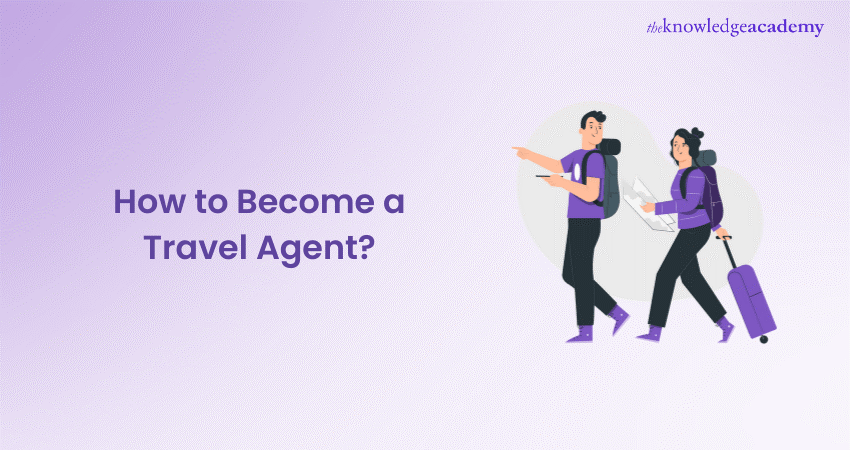
Do you have a knack for crafting perfect travel plans? Do you possess the skills to easily unravel and guide others through the complexities of the booking process? Then, the dynamic and lucrative world of travel agencies awaits! As a Travel Agent, you will serve as the mastermind behind ideal vacations for a broad range of travellers and destinations.
This blog uncovers everything you need to be the ideal fit for the Travel Agent Job Description. Read on, develop the essential skills and expertise, and master the art of turning dreams into memorable itineraries!
Table of Contents
1) Who is a Travel Agent?
2) Steps for Becoming a Travel Agent
3) Travel Agent Salary Expectations
4) Benefits of Being a Travel Agent
5) Conclusion
Who is a Travel Agent?
A Travel Agent is a professional who assists individuals and groups in planning, organising, and booking their travel arrangements. These arrangements include flights, accommodations, transportation, and other travel-related services.
Travel Agents serve as intermediaries between clients and travel suppliers including hotels, airlines and tour operators. They possess extensive knowledge of destinations, travel trends, and industry regulations.
With the advent of online booking platforms, Travel Agents have adapted by offering expertise, convenience, and personalised service that may not be readily available through automated systems.
They stay informed about visa requirements, travel restrictions, and safety measures, guiding clients through the complexities of international travel. From planning a family vacation or a business trip to a luxury getaway, a Travel Agent's expertise can enhance the overall travel experience and alleviate the stress associated with trip planning.
Role of a Travel Agent
A Travel Agent is key in orchestrating seamless and unforgettable client travel experiences. Their responsibilities include:
a) Booking flights and accommodations
b) Offering expert advice on destinations, activities, and cultural nuances.
c) Navigating complex itineraries to ensure smooth journeys.
d) Building relationships with clients
Ensure customised travel experience by tailoring itineraries to individual preferences.Their expertise, attention to detail, and dedication make them indispensable in simplifying travel planning and creating journeys that align with clients' aspirations.
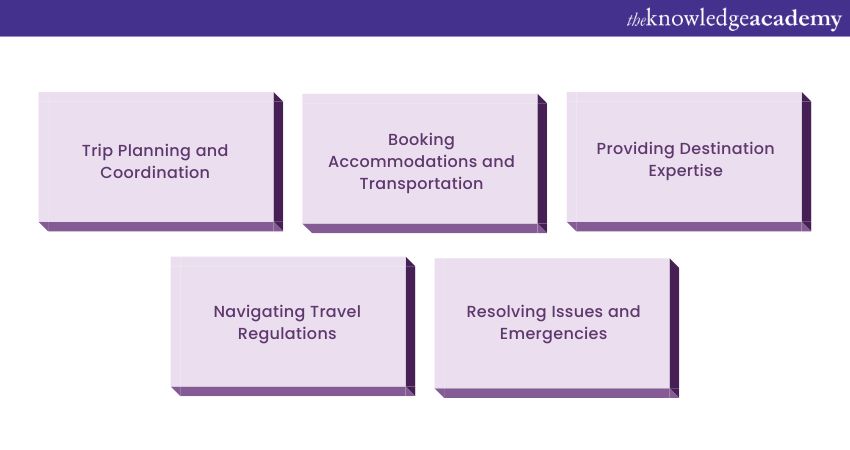
Steps for Becoming a Travel Agent
Now that you know the roles and responsibilities of a Travel Agent, it’s time to understand how to become a Travel Agent. Follow these steps to learn how:
1) Recognising the Necessary Skills
Before formally entering the Travel industry, it's crucial to recognise and cultivate the necessary skills. The following are some necessary Travel Agent skills that you must possess:
a) Effective communication is paramount, as Travel Agents regularly interact with clients, suppliers, and colleagues.
b) Attention to detail ensures accurate bookings and itineraries, contributing to client satisfaction.
c) Exceptional customer service skills are fundamental, as Travel Agents can serve as the primary point of contact for clients seeking personalised travel experiences.
d) Geographical knowledge is a cornerstone of success in this field.
e) A solid understanding of destinations, including cultural nuances, attractions, and travel logistics, enables Travel Agents to provide valuable insights to clients.
f) A passion for travel and a commitment to staying informed about industry trends showcase dedication and enthusiasm for the profession.
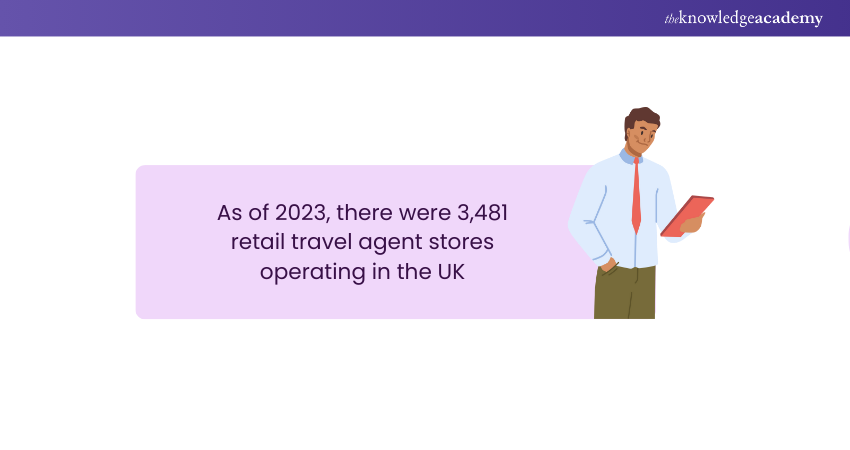
2) Joining Formal Training/Courses
While not mandatory, formal education provides a strong foundation for aspiring Travel Agents. Numerous vocational schools, community colleges, and universities offer programs in Travel and Tourism. These courses encompass a broad range of subjects, including geography, customer service, and travel agency operations.
Moreover, Formal training equips individuals with the essential knowledge and skills that helps them navigate the complexities of the travel industry. These programs often include practical components, allowing students to apply theoretical knowledge in real-world scenarios. Exposure to reservation systems, travel software, and industry best practices prepares individuals for operating travel agencies.
3) Undertaking Certification Programs
Consider pursuing certifications from reputable organisations to bolster your credibility and stay ahead in a competitive market. Certification programs often cover various topics, including:
a) Industry ethics
b) Legal regulation
c) Marketing
d) Sales
e) Customer service strategies
Completing such programmes expands the individual's knowledge base and instils confidence in clients and employers regarding their competence as travel professionals.
4) Developing a Professional Resume
Crafting a professional resume is critical in showcasing one's qualifications and making a positive impression on potential employers. Begin by highlighting relevant education, emphasising any degrees or certifications obtained in travel and tourism. Further, clearly outline skills such as effective communication, customer service, and travel-related software or reservation systems proficiency.
Moreover, in the experience section, detail any relevant work history, emphasising roles that involved customer interaction, sales, or responsibilities related to travel planning. Include specific accomplishments, such as managing complex itineraries, resolving customer issues, or exceeding sales targets. A well-crafted resume is a potent marketing tool that effectively communicates the candidate's suitability for a Travel Agent role.
5) Job Exploration
Exploring job opportunities within the travel industry is crucial for gaining practical experience. Entry-level positions in travel agencies, airlines, or tour companies provide exposure to the industry's day-to-day operations. You can experience roles such as:
a) Customer Service Representative
b) Travel Coordinator
c) Administrative Assistant
d) Reservation agent
e) Cruise consultant
These roles offer valuable insights into the dynamics of the travel business. During this phase, you can observe how travel agencies function firsthand, understand client expectations, and familiarise yourself with industry processes and terminology.
Elevate your sales game to unprecedented heights - join our Virtual Salesperson Course and revolutionise your approach to success!
6) Submitting a Job Application
Once you gain industry experience, the next step is to submit targeted job applications for Travel Agent positions. Tailor each application to align with the requirements of the specific role and emphasise relevant skills and experiences. Provide concrete examples of successful travel planning, customer interactions, and specialised knowledge, such as expertise in specific destinations or travel types.
A well-crafted cover letter should articulate your passion for travel, commitment to exceptional customer service, and eagerness to contribute to the travel agency's success. A polished application increases the likelihood of securing interviews and demonstrates professionalism to potential employers.
7) Interview Preparation
Adequate preparation for Travel Agent job interviews is essential for success in the competitive hiring process. Research common interview questions within the travel industry and formulate thoughtful responses highlighting the candidate's skills and experiences. Be ready to discuss specific scenarios related to travel planning, customer interactions, and problem-solving.
In addition to showcasing knowledge and expertise, interview preparation should involve familiarity with standard reservation systems or software used in the Travel industry. Demonstrating proficiency in these tools reinforces your readiness to handle the technical aspects of travel agency operations.
8) Building a Career
Upon successfully securing a Travel Agent position, the focus shifts to building a rewarding career within the Travel industry. You can take the following steps to fuel your professional development:
Actively engage in ongoing learning to stay informed about new destinations, emerging travel trends, and regulation changes.
a) Networking with industry professionals.
b) Attending travel conferences.
c) Participating in relevant workshops.
d) Building a client base and cultivating solid supplier relationships.
These activities are vital for a successful Travel Agent career.
9) Specialising in a Travel Niche
Specialising in travel niches is a strategic approach for Travel Agents to carve out a distinct identity in the competitive industry. Rather than offering generic travel services, specialisation allows them to focus on specific markets or interests, catering to a more targeted clientele.
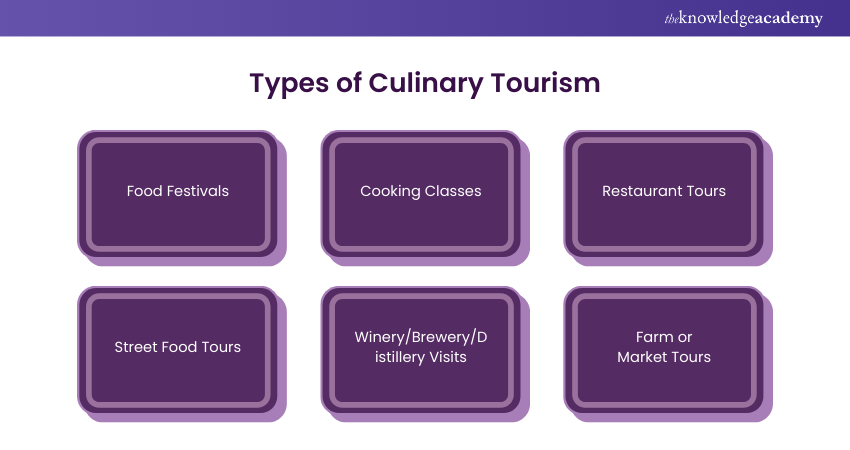
One popular niche is Adventure Travel, where agents curate experiences for thrill-seekers, incorporating activities like hiking, diving, or wildlife safaris. Cultural or Heritage Travel focuses on immersing clients in the history and traditions of a destination, providing unique insights into local lifestyles.
Culinary Tourism is another growing niche, appealing to those with a passion for gastronomy. Agents specialising in this niche create itineraries that revolve around local cuisines, cooking classes, and visits to renowned restaurants.
Luxury Travel is a well-established niche targeting clients seeking exclusive and opulent experiences. Agents in this niche curate high-end accommodations, private transportation, and personalised services. Specialising in niche markets, such as wellness or eco-friendly travel, allows agents to align with clients who prioritise health and sustainability.
Elevate your career from anywhere with our Virtual Online Job Roles Training – unlock new opportunities and skills for success!
Benefits of Being a Travel Agent
Becoming a Travel Agent comes with many benefits, making it a lucrative career choice for individuals passionate about travel and customer service. The following are some advantages of becoming a Travel Agent:
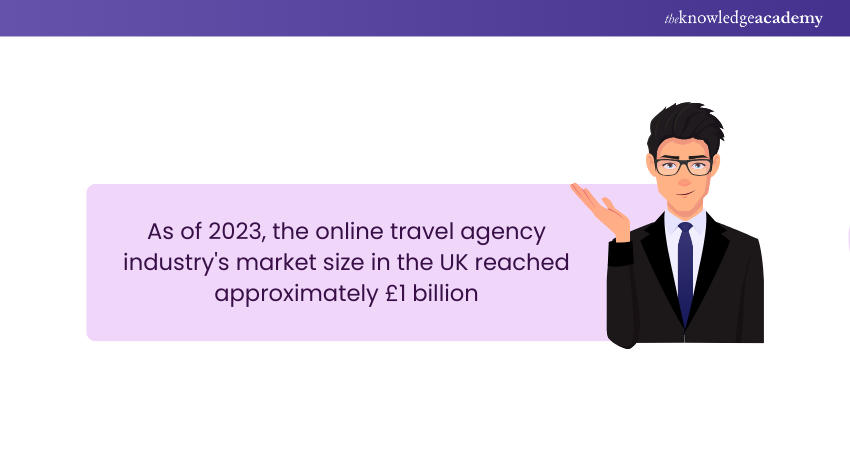
a) One significant advantage is the opportunity to immerse oneself in diverse cultures and destinations. Travel Agents often get firsthand experience of various locales, enabling them to offer authentic insights to clients.
b) Flexibility is another perk, allowing Travel Agents to manage their schedules and sometimes work remotely. This flexibility fosters a healthy work-life balance, appealing to those seeking autonomy in their professional lives.
c) Moreover, Travel Agents enjoy discounted or complimentary travel opportunities as part of familiarisation trips or exclusive deals offered by travel suppliers. This enhances their travel knowledge and allows them to curate personalised experiences for clients.
d) Building strong interpersonal skills is inherent to the role, enhancing the agent's ability to communicate effectively and understand clients' unique preferences.
e) This career also provides opportunities for networking, collaboration, and forming partnerships with various players in the travel industry.
f) The sense of fulfilment derived from helping clients create memorable travel experiences adds a rewarding aspect to the profession.
g) Travel Agents are pivotal in turning clients' dreams into reality, contributing to their satisfaction and building lasting relationships.
Travel Agent Salary Expectations
The salary may vary from agency to agency based on the location and the applicant’s experience. Here’s a breakdown of the average salary for Travel Agents across the UK, the USA and India:
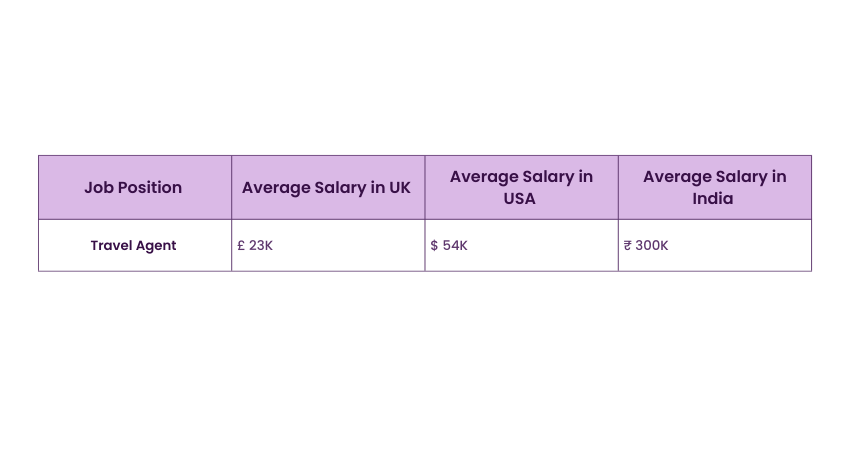
Conclusion
Travel Agents plays a crucial role in helping people arrange their trips. With the vast amounts of information available on the Internet, they become even more important in filtering out misinformation and helping people make informed decisions about their travel plans. The diverse aspects of the Travel Agent Job Description outlined in this blog will help you carve your niche in this dynamic career path.
Embark on a rewarding career journey in the travel industry – join our Travel Agent Training and soar to new heights!
Frequently Asked Questions

To become a Travel Agent, you will require educational qualifications such as high school diploma and college degree. You must gain a Travel Agent certification. Additionally, customer service experience, familiarity with travel booking software and in-depth knowledge of geography and destinations are necessary.

Some of the best software solutions that Travel Agents use include Salesforce, HubSpot, TravelPerk, Travefy, Skyscanner, Omio and TripActions

The Knowledge Academy takes global learning to new heights, offering over 30,000 online courses across 490+ locations in 220 countries. This expansive reach ensures accessibility and convenience for learners worldwide.
Alongside our diverse Online Course Catalogue, encompassing 19 major categories, we go the extra mile by providing a plethora of free educational Online Resources like News updates, Blogs, videos, webinars, and interview questions. Tailoring learning experiences further, professionals can maximise value with customisable Course Bundles of TKA.

The Knowledge Academy’s Knowledge Pass, a prepaid voucher, adds another layer of flexibility, allowing course bookings over a 12-month period. Join us on a journey where education knows no bounds.

The Knowledge Academy offers various Virtual Online Job Roles Courses, including the Virtual Salesperson Course and the Travel Agent Course. These courses cater to different skill levels, providing comprehensive insights into How to Become a Travel Agent.
Our Business Skills Blogs cover a range of topics related to Travel Agent, offering valuable resources, best practices, and industry insights. Whether you are a beginner or looking to advance your skills as a Travel Agent, The Knowledge Academy's diverse courses and informative blogs have got you covered.
Upcoming Business Skills Resources Batches & Dates
Date
 Travel Agent Training
Travel Agent Training
Fri 7th Feb 2025
Fri 4th Apr 2025
Fri 6th Jun 2025
Fri 8th Aug 2025
Fri 3rd Oct 2025
Fri 5th Dec 2025







 Top Rated Course
Top Rated Course



 If you wish to make any changes to your course, please
If you wish to make any changes to your course, please


